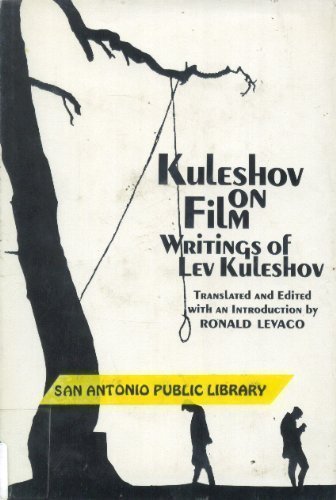Kuleshov on Film: Writings by Lev Kuleshov ebook download
Par crow robert le samedi, avril 16 2016, 21:56 - Lien permanent
Kuleshov on Film: Writings by Lev Kuleshov. Lev Vladimirovich Kuleshov, Ronald Levaco

Kuleshov.on.Film.Writings.by.Lev.Kuleshov.pdf
ISBN: 0520026594,9780520026599 | 121 pages | 4 Mb

Kuleshov on Film: Writings by Lev Kuleshov Lev Vladimirovich Kuleshov, Ronald Levaco
Publisher: Univ of California Pr
These three films and four others are showing at Facets Cinematheque this week, along with a film Barnet acted in (Lev Kuleshov's 1924 knockabout farce The Extraordinary Adventures of Mr. This was a time when the art form was extremely new, but audiences were already going nuts for stars. Most film narratives were analogous to silently filmed plays; each scene took place in front of a stationary camera, which was strategically placed to view the entire set, without any cutting or variation. The Kuleshov effect is a film editing technique that was recognised and demonstrated by Russian filmmaker Lev Kuleshov between 1910-1920 during his montage experiments. Among aficionados of early silent films, Lev Kuleshov, the Soviet film director, is known for his use of editing to evoke different emotions. In 1918 he conducted his famous experiment (below) using a single shot of the silent film actor Ivan Mozzhukhin's face looking at something off-camera. The Kuleshov effect is one of the great discoveries in the history of cinema, Lev Kuleshov a Soviet film maker was one of the first to dissect and analyze the emotion effect of visual montage and juxtaposition. Through-out the films that Kuleshov was creating they contained propaganda a form of information that is biased to support a specific view (in this issue it was a government, political view). Este ensayo estudia el uso del concepto de "Geografía Imaginaria" (definido por Lev Kuleshov con relación a uno de sus famosos experimentos) para crear significados en contraste -o en abierta oposición- con la realidad capturada por After a short period as the director of a group of cameramen in the Eastern Front immediately after the Revolution, Kuleshov was recruited to the teaching staff of the recently opened State Film School, and given his own 'workshop. The inevitable day eventually comes in film school in which one learns the famed and much-debated Kuleshov Effect. Lev Kuleshov and also Sergei Eisenstein were two film makers (both Russian) to really step this up. In the early 20th century, Russian filmmaker and theorist Lev Kuleshov discovered that a single shot of an actor with an ambiguous expression on his face could convey a multitude of very distinct meanings in the mind of the viewer, depending on the nature of the shot immediately preceding it. In the 1910s and 1920s, Lev Kuleshov was a famous Russian filmmaker curious about how audiences responded to film. Film language, as it would later be termed, had very little in the way of grammar, most Eisenstein's contemporary soviet theorist, Lev Kuleshov applied this precept to character development.